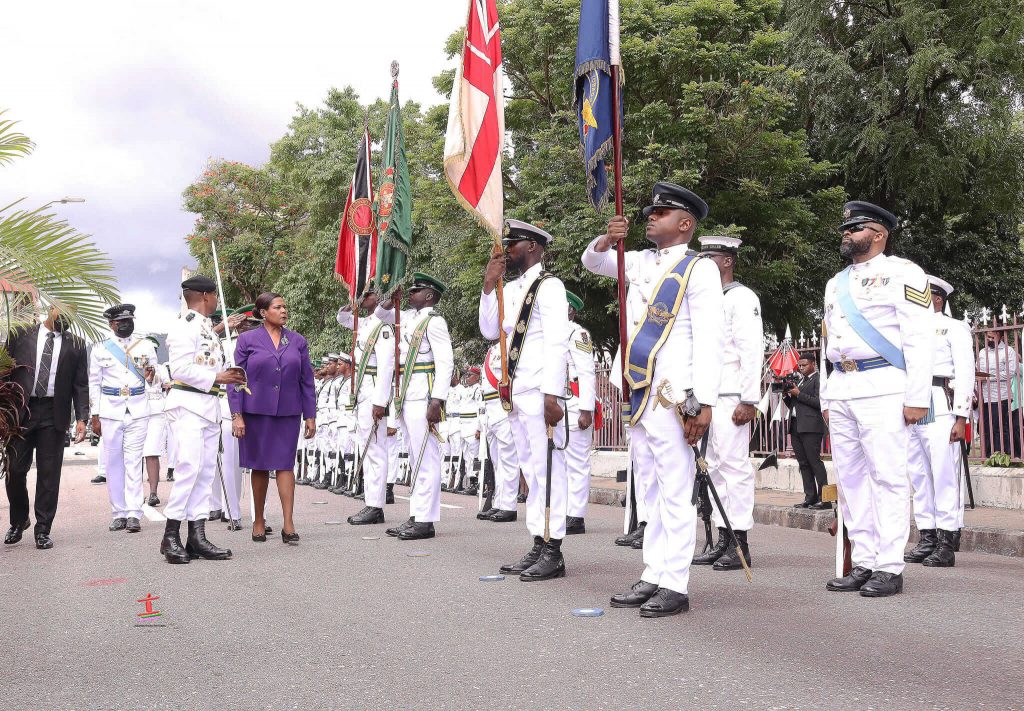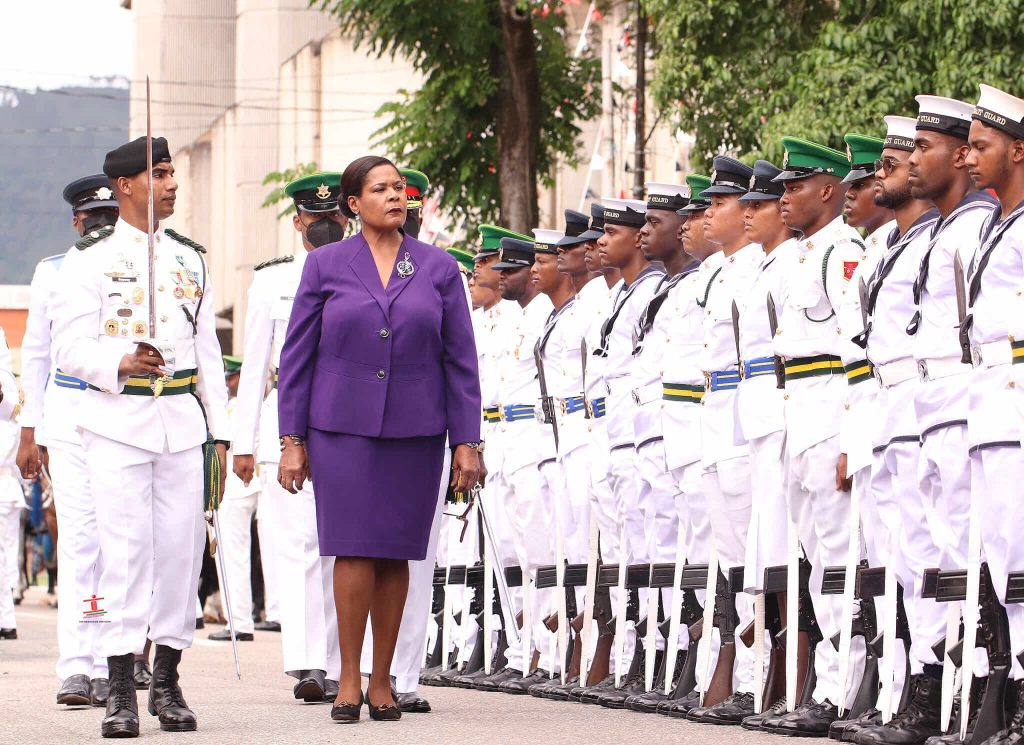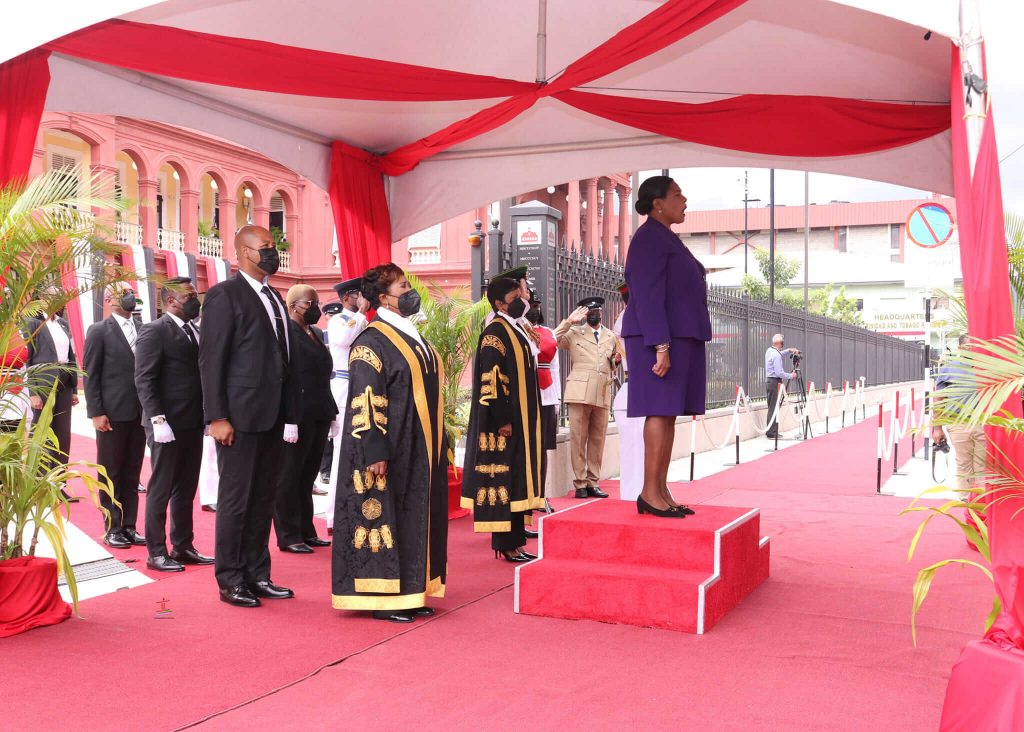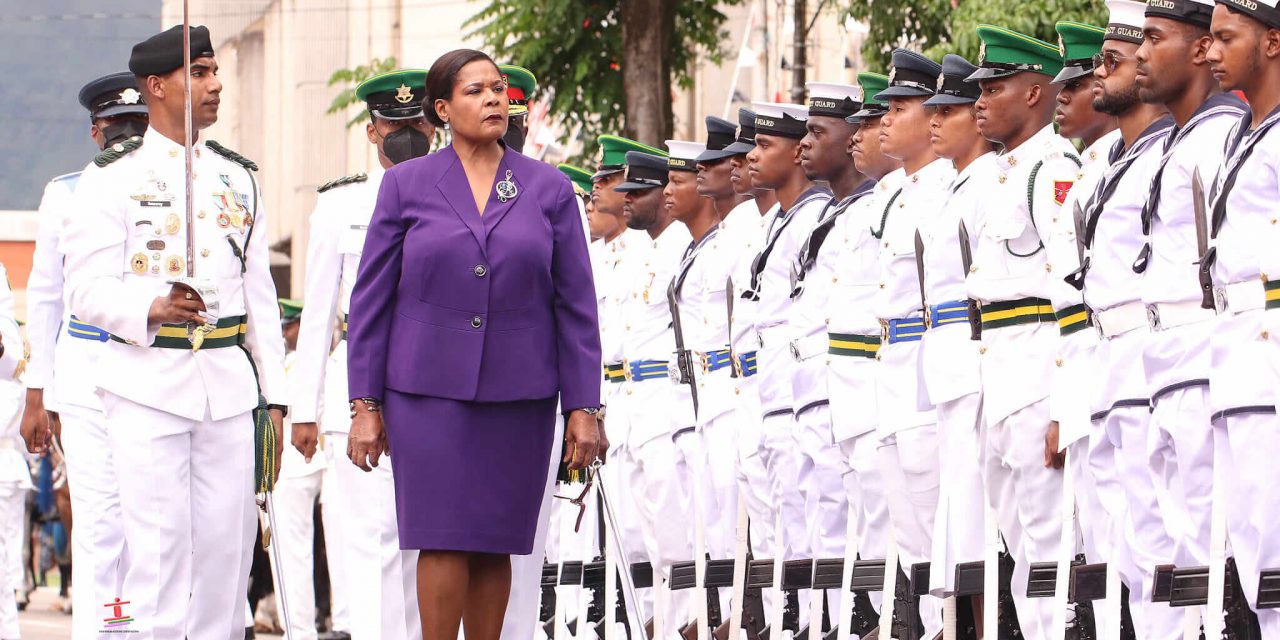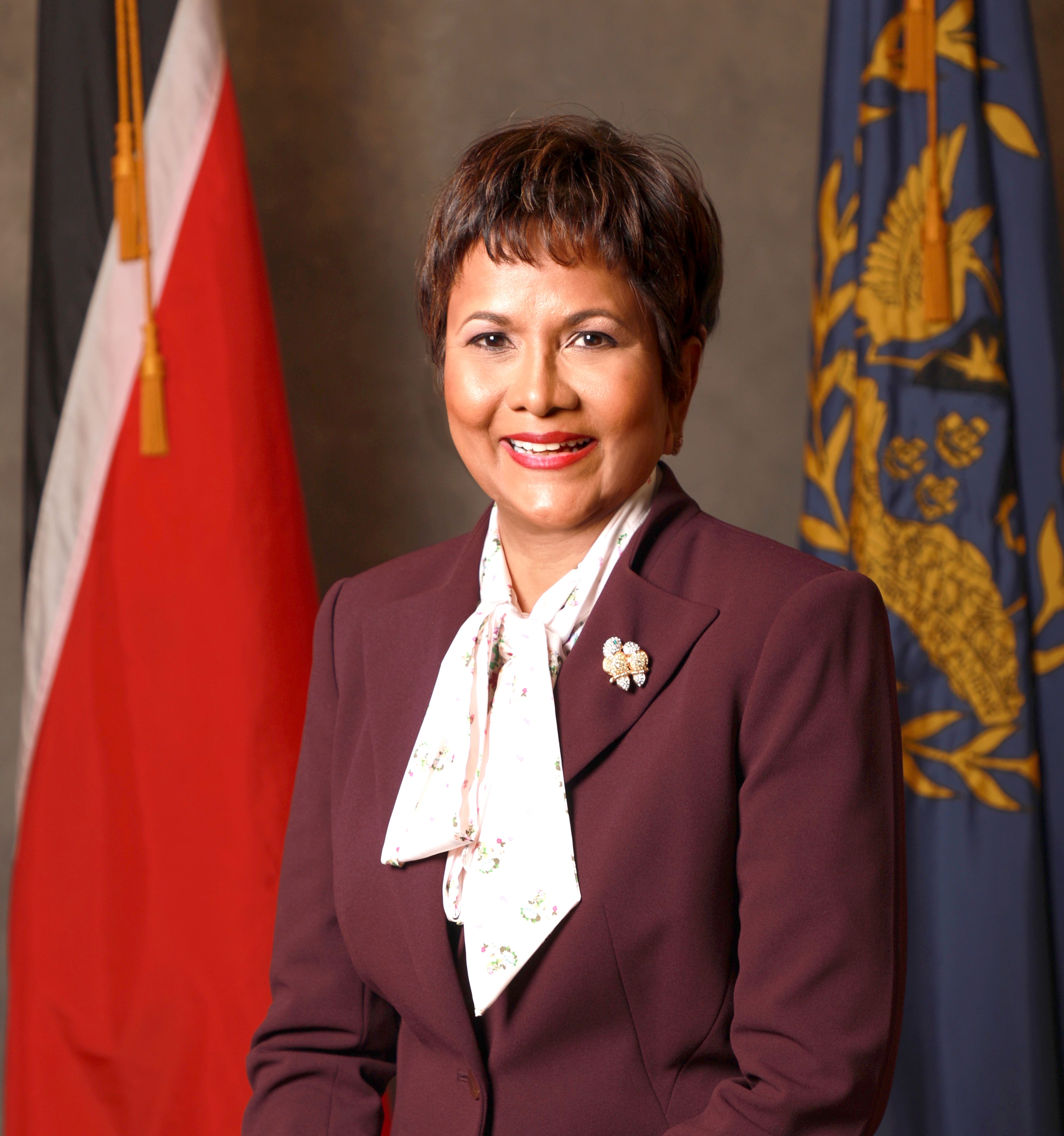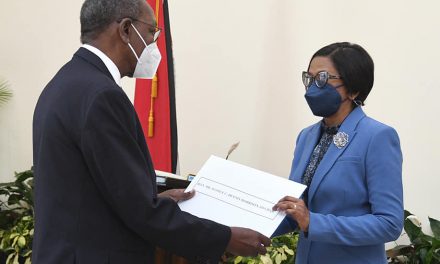Madame President of the Senate, Madame Speaker of the House, Honourable Members of Parliament.
Parliament exists for the primary purpose of making laws for the “peace, order and good government” of Trinidad and Tobago. We gather today in these august chambers to renew our efforts towards the fulfilment of this lofty objective. King Charles III expressed it this way as he addressed your counterparts, “Parliament is the living and breathing instrument of our democracy.” While in my capacity as Head of State I have already conveyed on behalf of the people of Trinidad and Tobago and on my own behalf, our condolences to King Charles III, members of the Royal Family, and the people of the United Kingdom of Great Britain and Northern Ireland, it would be remiss of me as I stand here today not to, as a member of Parliament, have put into the record my sincere commiserations to them all on the passing of Her Majesty Queen Elizabeth II.
In the 60 years since the House of Representatives and Senate sat for the first time in this very building, and having just marked our 60th anniversary of independence, we have seen 3 Independent and 12 Republican parliaments in which the interests of the people should have been ventilated, the Executive held to account and critical laws vigorously debated. We have also survived a violent and deadly assault and experienced disruptive shouting matches, chaotic debates, votes of no confidence, walkouts, putouts, even allegations of airborne crockery.
Those highs and lows have brought us to this juncture—the 3rd session of the 12th Parliament of the Republic of Trinidad and Tobago—and as I thank Madame Speaker for her kind invitation to address you today, I ask you to consider whether 60 years of independence have brought us significantly closer to the core mission of these distinguished Houses.
Parliament is the fountainhead of the laws that affect the man and woman in the street. Another of its roles is to scrutinise and check the work of the government, and since 18 August 2006, when the Parliament Channel was first launched, citizens have also been able to scrutinise and check the work of Parliament, more specifically, the decorum, commitment and temperament of its members. Every gracious concession and compromise is witnessed by the populace, as is every insult, put-down, and falsehood which contributes to the negative perception of what should be an esteemed and respected institution. To the average citizen, sittings of parliament seem more opportunities for finger pointing, ‘gallerying’ and ‘kicksin’, than fora for the conscientious making of laws that would directly affect and improve their lives.
Parliament, and its members, have long been objects of public derision. People look on at these proceedings with resignation, despair, or worse, contempt. The respect, trust and confidence that once characterised the relationship between parliamentarian and John Q. Public have been squandered and whittled away, leaving little but disregard, suspicion and doubt as to the capabilities and motives of those elected and appointed to conduct the affairs of the nation. Please let us not find ourselves having to identify with the sentiments of Scottish novelist Robert Louis Stevenson who wrote in 1887, regarding the British House of Commons, “We all know what Parliament is, and we are all ashamed of it”.
Citizens want parliamentarians to put aside selfish agenda and work to secure the welfare and wellbeing of all. You are at the vanguard of upholding our democracy, tasked with representing the interests of your constituents, debating the germane issues that matter to Trinbagonians and making relevant and useful laws that will contribute to national development. Challenges, old and new, must be tackled head-on and with wisdom, industry and cooperation.
None of this can be achieved if the starting point is ugly party politics or a tit-for-tat partisan agenda. If unnecessary contention, the exchange of wild accusations and insults, and abrupt withdrawals, are the order of the day, how and when will the people’s business be conducted? An old African proverb is apposite here, “when elephants fight, the grass gets trampled”. Whether you represent Diego Martin West or Siparia, St Ann’s East or Barataria/San Juan, Arima or Fyzabad, it is your constituents who feel the heat and suffer the repercussions of your inability or refusal to work together for the common good. The people of Trinidad and Tobago whom you offered and were chosen to serve deserve better—much better.
You promised to bear true faith and allegiance to Trinidad and Tobago, uphold the Constitution and the law, and conscientiously and impartially discharge the responsibilities to the people of Trinidad and Tobago upon which you entered. You made solemn and significant promises to the nation, promises that you are duty bound to keep and hold in high regard. No dispute or grievance should ever take precedence over your oath and role as parliamentarians and servants of the republic.
These chambers are not a venue for partisanship, but for patriotism which transcends cultural, racial and political bounds—the one true bipartisan endeavour. Patriotism, according to former American politician Adlai Stevenson, is “not a short and frenzied outburst of emotion but the tranquil and steady dedication of a lifetime.” It therefore involves commitment, focus, selflessness, resolve, passion, cooperation¬—values that promote peace, order and good governance.
Trinidad and Tobago is just now coming up for air after two long years of a stifling pandemic which crushed the hopes and plans of many and has shaken our economy to its core. As we continue to grapple with the ever-present ills of crime and criminality, racism, unemployment, environmental disaster and recently in the public eye, child abuse, there is a desperate need for some assurance that things will get better, and people are entitled to, and do, demand more of their representatives.
Not two weeks ago, the nation joyfully celebrated its diamond jubilee. Messages of congratulation came from many quarters, local and foreign, to mark this momentous milestone. The common themes of hope, jubilation and national pride contained in those messages were mirrored in the national mood as people enjoyed and participated in the programme of events. Anniversaries—always fitting occasions for reflection, celebration and forging new paths—speak of fresh beginnings and offer the opportunity for the renewal of vows and promises.
In this our 61st year, it is time to inject some confidence and optimism into our population, not by mere words but by action. This is a new session of parliament, a chance for a new beginning, a tabula rasa so to speak. It is a golden opportunity to offer to our nation, perhaps as an independence gift, fresh perspectives, attitudes and behaviours as you endeavour to fulfil the oaths you took upon assuming your duties as parliamentarians. Why not use this new session of parliament to present an alternative to a regrettable status quo? Resolve to put behind petty squabbles and divisions and work together for the benefit of all.
We are a young nation, to be sure, but that does not preclude a maturity of approach when it comes to politics and making decisions that affect the lives of our people. I am by no means suggesting that we don rose-tinted spectacles and pretend that our problems do not exist. I am merely advocating a different approach; a collaborative effort by the members of these noble Houses. After all, that is what proper representation is about. Whether in government, opposition or an independent, as a parliamentarian your duty is to represent the citizens’ interests, to pass laws, and to monitor the actions of the government. Those are hallmarks of development and progress that can only be achieved when you put aside animosity and embrace collaboration.
This 12th parliament has to date produced approximately 45 acts out of 71 sittings of the House of Representatives and 69 of the Senate. There is still much more to be done. Your presence in these august chambers today is understood to be an indication that you have an interest in realising your fundamental objectives. Renowned scholar and author C.S. Lewis opines that ‘the State exists simply to promote and to protect the ordinary happiness of human beings in this life’. And after giving a few examples of such happiness, he concluded that, “unless they are helping to increase and prolong and protect such moments, all the laws, parliaments, armies, courts, police, economics etc., are simply a waste of time”. Ensure that history does not judge this 3rd session of the 12th Parliament of the Republic of Trinidad and Tobago harshly.
May God Bless Our Nation.
